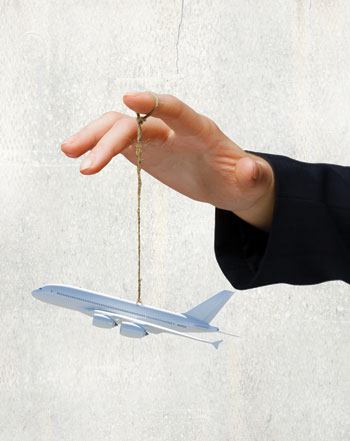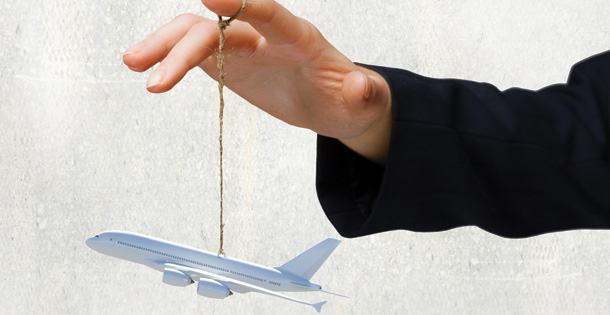
At the time, I was sitting in the company plane sipping Maalox and watching a guy in coveralls load briefcases and golf gear into our cargo hold. His breath made little white clouds in the air. It was Christmas Eve, and my colleagues and I were headed to Orlando for meetings, our pinstriped bottoms strapped into the eight passenger seats of a twin-engine King Air. My knuckles tightened on my antacid bottle as the props began to spin.
I know what you’re thinking. People were working — flying to business meetings, no less — on the day before Christmas? You bet we were. The rest of the world might be off and doing their gift shopping and enjoying the holidays, but not the tireless and loyal employees of Randolph Goodwynter.
The noise of the propellers grew, buzzing into my brain. It was not my favorite sound. For the past six months I’d been traveling four days a week, a husband and father in name only, job stress draining me dry. The familiar roar of aircraft engines — any kind, jet or prop — had become worse, to me, than fingernails on a chalkboard.
And then the roaring stopped. The pilot cut the engines, left the cockpit, and moved past us to the exit. From my window I saw Al McGee, one of our VPs, crossing the tarmac in our direction. All of us heard him climb the staircase the pilot had lowered.
A second later McGee stuck his head through the doorway, along with a blast of chilly outside air. “One of you come with me.”
“What do you m-m-mean?” Michael Finch asked. His stuttering seemed to surprise McGee. The rest of us were used to it.
“I mean we need a seat. R.G.’s decided to go along, and since you’re full here, somebody has to get off.”
I was sitting up front and facing the rear, so I could see everyone and everything. All of us exchanged glances.
“You mean he’s bumping us?” I asked McGee.
“One of you. Come on, I need a volunteer.”
“But this is crazy, Al. We have three meetings with three different clients today. If we weren’t all needed, we wouldn’t all be going.”
McGee sighed. “This isn’t debatable, okay? He’ll be here any min—”
“Is there a problem, Al?” a voice said, from the stairs. That voice was another sound I had grown to dread. It belonged to Randolph Goodwynter III, our president and CEO.
A moment later he squeezed past Al McGee and into the narrow aisle. McGee disappeared.
Goodwynter just stood there, looking at each of us in turn. He was so short he barely had to stoop in the tight quarters. “Sorry about this,” he said, not looking a bit sorry. “Who’s the least-senior person here?”
Young Jenny Peavler, sitting across from me, cleared her throat. “That would be me, Mr. Goodwynter.”
“Get your things. I’m taking your seat.”
 Before she could move, Michael Finch said, “I need Peavler t-t-today, sir. She’s vital to our m-m-meeting.”
Before she could move, Michael Finch said, “I need Peavler t-t-today, sir. She’s vital to our m-m-meeting.”
Goodwynter turned and gave Finch a long, measuring look. “She can take a later flight.”
“It’s C-C-Christmas Eve. I’m not s-s-sure there is a later f-f-f-flight.”
“Then you’ll have to do without her today.”
Finch’s gaze flicked down to Goodwynter’s polo shirt and slacks beneath his now-open overcoat. Already dressed and ready for sunny Florida. “Will you be g-g-going with us to the m-m-meeting, then?”
“I’ll be playing golf,” Goodwynter said, without a hint of embarrassment.
Michael Finch was quiet a moment. The whole plane was quiet.
“This isn’t r-r-right,” Finch murmured.
Goodwynter’s eyes narrowed. “What did you say?”
“I said th-th-this isn’t right.”
The two men stared at each other in the dead silence while the rest of us watched them. Randolph Goodwynter’s face had gone rock-still. I was suddenly aware that I was holding my breath.
Finally Goodwynter said, “So you think I’m out of line, doing this? Is that it?”
Finch swallowed. “Yes, sir. I do.”
“Well then, let me ask you, young man: Is this your airplane?”
“No, sir.”
“Is this your company?”
“No, sir. It is not.”
“But you still think it’s wrong.”
Finch raised his chin and, God bless him, said, “Yes.”
The silence dragged out. In the distance, I could hear planes droning in and out of the airport. Here inside the cabin, I could hear my heart hammering its accompaniment to the backflips going on inside my stomach.
Goodwynter turned his head to study each of us, one at a time. Then he looked again at Finch. “And you are … ?”
“Finch. Michael J.”
“Well, tell me, Finch — how would you like to be VP of marketing?”
Finch blinked. “Sir?”
“You heard me. Osborne’s retiring on January first. What do you say?”
“Why … I don’t know, Mr. Goodwynter.”
Goodwynter squinted, pursed his lips. “What if I told you I had no intention of taking one of your seats?”
“Excuse me?”
“This was a test, Finch,” Goodwynter said. “And you passed. I need someone tough for Osborne’s job, someone who has priorities and who’ll stand up for them.”
“So … you’re not going with us?” Finch said.
“Where I’m going’s to the club — the one here, not in Orlando — and meet my wife for a late breakfast. Then I’m going with her to buy presents for our grandchildren and then calling the office to announce your promotion. Congratulations, by the way.” Goodwynter glared at the rest of us, turned on his heel, and marched down the stairs and back to the terminal. Al McGee, who must have been waiting beside the plane, scurried after him.
Michael Finch looked a little dazed. We all exhaled and relaxed a bit, but the tension stayed in the air. There had been a spooky look in Randolph Goodwynter’s eye just before he left. Everyone there had seen it.
The pilot’s voice interrupted my thoughts. “We ready to go now?” He had already raised the stairs and returned to the cockpit, and was staring out at us as if wondering how we might look stuffed and mounted in his den.
“I guess so,” I told him. Something was bothering me, something important, but I couldn’t pin it down. I leaned back in my seat as the engines growled again and we started to move.
And then it hit me. I replayed it in my mind, then nodded. I must have had a grim look on my face, because all of a sudden everybody in the cabin was watching me.
“Stop the plane,” I said over my shoulder, to the pilot.
We jerked to a stop and sat there, the motors idling. I unbuckled my seatbelt and picked up my briefcase.
“What’s the matter, Charlie?” Jenny Peavler asked. “What are you doing?”
“The matter,” I said, rising from my seat, “is something I saw earlier. And what I’m doing is giving myself a Christmas gift.”
“What?”
“I’m quitting,” I said. “I should have done it a long time ago.” I walked past their stunned faces, heading for the exit. The pilot followed me.
While the steps were being lowered again, one of my colleagues blurted, “Wait, Charlie, you can’t just quit. What was it you saw?”
I regarded him a moment, then said, “A golf bag.”
He just stared at me.
“They put it in the cargo hold,” I said. I looked at the others, and watched the lightbulbs come on in their heads. It was obvious, really. If that had been no more than a test just now, if Goodwynter wasn’t really planning to go along, why had he bothered to load his golf bag? It was only by chance that I’d glimpsed it.
Want to see your story published?
Read our Great American Fiction Contest anthologies to find out what it takes. Order them now at saturdayeveningpost.com/ fiction-books.
“This wasn’t about Michael,” I added, glancing at Finch. He and I both knew, I think, that Goodwynter would find a way, sometime between now and New Year’s Day, to keep from honoring his promise. “This was damage control. After Finch challenged him, R.G. smelled a mutiny brewing, and changed his plans to make us think he had staged all this to find a replacement for Osborne.” It was fascinating, really: We’d been granted a close-up view of our boss’s idea of business ethics. A real-life, 10-minute seminar on right vs. wrong.
Then I had another thought, and smiled at Finch. “You stopped stuttering. Did you notice?”
He looked surprised, then grinned too. “Guess I did, at that.”
The pilot was losing patience. “Going or staying?” he asked me.
“Going.” I turned to my co-workers, smiled with what I hoped they’d know was heartfelt sincerity, and said, “Merry Christmas.”
Without another word I clomped down the stairs, and when my feet touched ground I realized my stomach felt better than it had in a long time. I took a breath of frigid morning air. From where I stood, I could see holiday decorations on the shrubs and trees outside the airport’s perimeter fence, and the feathery wisp of clouds high in the clear blue sky. I could hear, in between the rumble of takeoffs and landings, a tinny version of “Jingle Bells” from a loudspeaker far away, and the laughing voices of children. Maybe that last part was imagined, but it seemed real. It seemed comforting. Good sounds, from another world.
Halfway to the terminal, I heard something behind me. When I turned I saw four of my seven colleagues, including Michael Finch, filing down the steps and off the plane.
And I noticed, before turning away again, that they looked different. Not relaxed, exactly, but content. Satisfied.
Maybe all of us stopped stuttering that Christmas Eve.
I never saw Randolph Goodwynter again, or McGee or Finch or Peavler, and I have no idea whether the plane went on to Florida that morning. I do remember thinking about it, though, when I reached my car and drove away from the airport. I also remember how good it felt not to care, one way or the other.
R.G. had been right, about one thing at least.
It was a matter of priorities.
Become a Saturday Evening Post member and enjoy unlimited access. Subscribe now




Comments
Very nicely done – and leaves something to think about, especially at holiday time. Thanks!